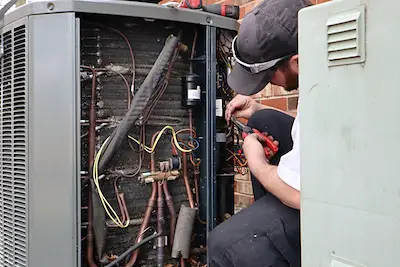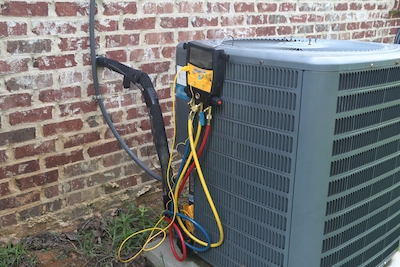The HVAC system is one of the most important components in your home, which also makes it an expensive part. This means that when there are problems with your HVAC system, you face the tough decisions about whether or not you should fix it or buy a new one.
Should I Repair or Replace My HVAC System? HVAC repairs and maintenance can be expensive. As a rule of thumb, when the cost to repair your unit is more than half the cost of a new unit the long term value of a new unit would be worth the additional cost. This is the point when it no longer makes good economic sense to keep repairing an old HVAC system. In those instances, getting a replacement will usually represent better value in the long run.
I recently dealt with this exact issue and had to do the research to see what was right for me. I going to provide you with the information I used to determine whether repairing or replacing my HVAC system is the best choice for me.
When should you consider an HVAC replacement?
Every case is different, so we won’t get into the faults that could make an HVAC replacement more economical than a repair. However, there are a few warning signs that suggest it might be time to replace your HVAC system.
1. Your HVAC system is aging – There are several variables that affect how long your HVAC system should last. That includes its run-time hours per day, how efficient it is, how regularly it has been maintained, and more. However, on average, an HVAC system lasts around 10-15 years. If your system is that age or older and needs a repair, it may make more sense to replace it.
2. Your energy bills are rising – Today’s HVAC systems are far more energy-efficient than they were a decade ago. If your energy bills are rising or you have made changes to your property that make your current system no longer suitable, then replacing your HVAC system might be the right decision for you.
3. The repair costs are soaring – If your HVAC system needs frequent repairs and the cost of those repairs is on the up, it could be time for a replacement. As a general rule, if the cost to fix an HVAC is half as much as the price of a new system and your current system is 10 or more years old, you should seriously consider a replacement.
4. Your air conditioning unit runs on Freon – The Environmental Protection Agency blocked the production of Freon (R-22) in January last year (2020), and more environmentally friendly refrigerants are now being used. Although the Environmental Protection Agency does not require homeowners with Freon air conditioning systems to replace them, you will make long-term savings by switching to a more energy-efficient solution.
5. Your indoor air quality is poor – If you’re noticing a deterioration in the air quality in your home and your HVAC system is getting old, then it’s time you got a replacement. Of course, it could simply be a case of replacing or upgrading your air filter to improve the air quality. However, if there’s more dust on your surfaces and musty odors even after the new air filter has been fitted, a replacement could be the best option.
6. Some rooms are hotter than others – A classic sign of an aging HVAC system is having some rooms in your home that are hotter or colder than others. This is the result of a unit that is struggling to deliver consistent heating and cooling power. While air balancing can provide a short-term fix, in the long-term, you’ll likely need a replacement.
7. It’s becoming noisy – We hate to say it, but that clicking, grinding, or rattling noise coming from your HVAC system is not good news. It’s symptomatic of components that are wearing out and will often be the first sign that your furnace is starting to fail. Scheduling an HVAC service should always be your starting point, but you should also prepare yourself for the fact that an HVAC replacement may be on the horizon.
When should you repair your HVAC system?
The truth is that HVAC failures happen. It’s an unfortunate but inevitable part of the wear and tear involved in running an HVAC unit. However, if your HVAC system is in good working condition and is well maintained, those repairs should only occur once every few years.
Examples of some of the most common HVAC repairs include:
- Dirty filters – Replacing your filter regularly is the single most important thing you can do to keep your HVAC system running efficiently and to extend the life of your unit.
- Pilot or ignition problems – These can be caused by many issues, such as short cycling, a pilot outage, delayed ignition of the burners, or even a gas supply problem. These issues can be easily repaired by a qualified HVAC technician.
- Dirty condenser or evaporator coils – Dirt and debris can clog the coils on your system and reduce the efficiency of your air conditioner and furnace. These can be easily cleaned yourself, although if they’re extremely dirty, it’s a job that’s best left to the professionals.
- Thermostat problems – Programmable thermostats may have batteries that need to be replaced and referring to the owner’s manual can help you resolve programming issues. If the thermostat is still malfunctioning, problems can usually be quickly resolved by a professional.
- Water leaks – All HVAC systems produce condensation but a water leak is something very different. A water leak is usually a sign of a clog or a broken piece that runs to the pipe or a drain. Leaks need to be resolved quickly and usually the fault causing the leak can be repaired without too much trouble.
All of these are examples of faults that can usually be repaired very easily. However, sometimes you may have a more serious fault that’s more expensive to fix. In that case, how do you know whether it’s better to repair or replace the HVAC system? There’s a simple equation that can help.
Once you have a quote for the repair from the professionals, just multiply the cost by the unit’s age. If the total is less than $5,000, a repair will usually represent better value for money. If the total exceeds $5,000, you should seriously consider a replacement.
For example:
Cost of repair – $700
Age of system – 5 years
Total – $3,500 – repair rather than replace your system
If in doubt, call the pros!
We hope these pointers make the decision to repair or replace your HVAC a little easier. However, if you’re in doubt, just call the professionals. Your local expert HVAC specialists will happily provide the expert and impartial advice you need.


